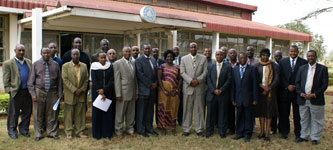 (IGAD – Nairobi) A five days training on the basics of Geographic Information System (GIS) and sensitization on the potential role of the GIS in livestock policy decision making was convened at the Regional Centre for Mapping of Resources for Development (RCMRD) in Nairobi, Kenya.
(IGAD – Nairobi) A five days training on the basics of Geographic Information System (GIS) and sensitization on the potential role of the GIS in livestock policy decision making was convened at the Regional Centre for Mapping of Resources for Development (RCMRD) in Nairobi, Kenya. The participants of the training comprised of the National Information Node Coordinators and National Technical Focal Points of the IGAD Livestock Policy Initiative from IGAD Member States. The participants are expected to acquire the necessary skills in the use of the GIS technology and spatial data and to harness these technologies effectively to be able to make informed livestock policy decisions.
Kenya’s Deputy Minister of Livestock, Mr. Adam Barre Duale, speaking at the opening ceremony urged IGAD member states to be more proactive in the livestock sector policy and development.
“Unless, as governments, we invest in the livestock sector, then the training, information, and all your hard work will not bear enough roots,” said Mr. Dualle.
“We are about 200 million people in this region against the world population of about 6 billion. That puts us 3% of the entire global population. At the same time, we are beneficiaries to about 40% of the entire global food aid program as well as to 5% of the entire school feeding program,” said Eng. Maalim.
“Policy making is about making choices and choices can only be made if you have proper information and evidence,” he said “We hope that the GIS will form the basis for informed decision making.”
The RCMRD is an intergovernmental organization with fifteen member states whose mandate is to promote the use of Information Technology and Geographical informational for sustainable development.
“The role we play, together with other organizations like IGAD will help our member countries develop economically,” said Dr. Hussein Farah, the Director General of RCMRD.
“Information Technology, especially Geo-information plays a critical role in making sure that policies we make are based on rigours information, and relevant evidence,” said Mr. Farah.
IGAD Livestock Policy Initiative is a capacity building project being implemented by the Food and Agriculture Organization of the United Nations in cooperation with IGAD. The project purpose is to strengthen the capacity in IGAD, its member states, other regional organizations and other stake holders to formulate and implement livestock sector and related policies that sustainably reduce food insecurity and poverty.
“The project focuses on two key policy areas: the adequate inclusion of livestock in poverty reduction strategies and national planning; and the development of a Regional Policy Framework for Animal Health and Trade” said Dr. Abdi Jama, Livestock Information Advisor of IGAD LPI.
“Furthermore, the fact is that livestock is not adequately represented in the national development plans. On the Regional Policy Framework on Animal Health and Trade, the project has been working with the IGAD member states to develop their national positions with the guidance of the project. These country positions will be assembled together and harmonized to be endorsed by the ministers in charge of livestock convened by IIGAD.